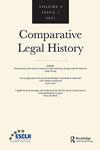夹在怀旧与现代化之间:日本刑事司法与刑罚的历史
IF 0.5
Q2 LAW
引用次数: 0
摘要
本文通过对日本从中世纪到近代犯罪与刑罚的文献回顾,揭示了推动刑法与刑事司法演变的矛盾力量。个人对国家,人权对政府权力——这些都是日本统治者和法律思想家一直面临的一些斗争。在德川时代最初的一段孤立时期之后,日本的刑事司法制度虽然采用了比较方法,但在怀念传统价值观和要求承认普遍权利之间不断转换,从而得到了发展。通过追踪导致现代刑事司法系统的支离破碎的过程,本研究显示了法律移植对国家刑事政策的影响,特别是对保守派和进步主义者之间的斗争的影响。保守派以传统价值观的名义要求更广泛的政府权力,而进步主义者则对侵犯人权的威胁发出警告。本文章由计算机程序翻译,如有差异,请以英文原文为准。
Caught between nostalgia and modernisation: The history of criminal justice and punishments in Japan
Building upon the literature review of crimes and punishments in Japan from the Middle Ages to modern times, this paper highlights the contradictory forces driving the evolution of criminal law and criminal justice. Individual versus State, human rights versus government powers – these are some of the struggles Japanese rulers and legal thinkers have been facing. After an initial period of isolation during the Tokugawa Era, the country's criminal justice system, although it embraced a comparative approach, has nevertheless developed by constantly switching between nostalgia for traditional values and demand for the acknowledgement of universal rights. By tracing the fragmented process that led to a modern criminal justice system, the present research shows the effect of legal transplants on national criminal policies and, in particular, on the struggle between the conservatives, who claim wider government powers in the name of traditional values, and the progressivists, who warn against the threat of human rights violations.
求助全文
通过发布文献求助,成功后即可免费获取论文全文。
去求助
来源期刊
CiteScore
1.70
自引率
0.00%
发文量
20
期刊介绍:
Comparative Legal History is an international and comparative review of law and history. Articles will explore both ''internal'' legal history (doctrinal and disciplinary developments in the law) and ''external'' legal history (legal ideas and institutions in wider contexts). Rooted in the complexity of the various Western legal traditions worldwide, the journal will also investigate other laws and customs from around the globe. Comparisons may be either temporal or geographical and both legal and other law-like normative traditions will be considered. Scholarship on comparative and trans-national historiography, including trans-disciplinary approaches, is particularly welcome.

 求助内容:
求助内容: 应助结果提醒方式:
应助结果提醒方式:


